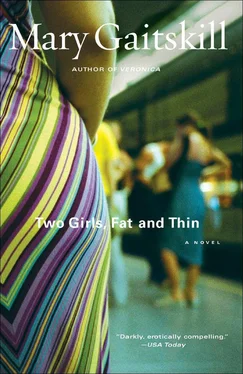Mary Gaitskill - Two Girls, Fat and Thin
Здесь есть возможность читать онлайн «Mary Gaitskill - Two Girls, Fat and Thin» весь текст электронной книги совершенно бесплатно (целиком полную версию без сокращений). В некоторых случаях можно слушать аудио, скачать через торрент в формате fb2 и присутствует краткое содержание. Год выпуска: 2012, Издательство: Simon & Schuster, Жанр: Современная проза, на английском языке. Описание произведения, (предисловие) а так же отзывы посетителей доступны на портале библиотеки ЛибКат.
- Название:Two Girls, Fat and Thin
- Автор:
- Издательство:Simon & Schuster
- Жанр:
- Год:2012
- ISBN:нет данных
- Рейтинг книги:5 / 5. Голосов: 1
-
Избранное:Добавить в избранное
- Отзывы:
-
Ваша оценка:
- 100
- 1
- 2
- 3
- 4
- 5
Two Girls, Fat and Thin: краткое содержание, описание и аннотация
Предлагаем к чтению аннотацию, описание, краткое содержание или предисловие (зависит от того, что написал сам автор книги «Two Girls, Fat and Thin»). Если вы не нашли необходимую информацию о книге — напишите в комментариях, мы постараемся отыскать её.
Review) create a haunting and unforgettable journey into the dark side of contemporary life and the deepest recesses of the soul.
Two Girls, Fat and Thin — читать онлайн бесплатно полную книгу (весь текст) целиком
Ниже представлен текст книги, разбитый по страницам. Система сохранения места последней прочитанной страницы, позволяет с удобством читать онлайн бесплатно книгу «Two Girls, Fat and Thin», без необходимости каждый раз заново искать на чём Вы остановились. Поставьте закладку, и сможете в любой момент перейти на страницу, на которой закончили чтение.
Интервал:
Закладка:
I did in reality see them in the locker room together, padding around in their underwear, whispering and giggling. I did see them swimming together once, and perhaps, in some dim way, recognized two familiar prototypes as Emma, like my mother, paddled nervously behind while Mona, like Edwina Barney, cut through the water with brisk strokes. The rest of the class gamboled about them, their playful screams rising in the echoing air while I sat in my chair and watched with the silent group of girls who always had their period when a swimming class was scheduled.
There were many others about whom I formed such beautiful and elaborate fantasies. There were the D’Arcy twins, tall and bony-legged girls with curly black hair and prominent ribs. Their strident athleticism, their barking voices, in which they talked of “really creaming” somebody made me envision them in white leather, armed with bows and arrows, smiling as they entered a field of battle and carnage, perhaps looking for souvenirs of teeth or buttons.
There was Jana Morgan, close friend of Emma Contrell and even more of a slut, a dumb-eyed girl with a big oval face, big lips, and a graceful, acquiescent neck. She was loud, foul, and kind, she wanted more than anything to attract the attention of everyone around her. She sat straddling her chair in her short skirt and badly run pantyhose, twisting her torso coquettishly as she whispered to a boy or passed a note to a girl; she popped big bubbles of gum and flirted with teachers. She often had to report to the principal’s office, and she went with defiance in the swing of her hips, turning when she reached the door to whisper dramatically, “I’ll never tell!” in imitation of those handsome and noble TV prisoners of the Gestapo who always escape over the barbed wire on their motorcycles. In the frequent wars of my dreams, she appeared as the most valuable prisoner in the enemy’s detention system; she and I were among the unbreakable cadre that our captors had so far failed to brainwash. Although they led her away daily to be savagely interrogated, Jana still gallantly cried out, “I’ll never tell!” and she looked at me with eyes of such understanding and connection that I awoke feeling deeply and tragically moved, as though someone I loved had died in my arms.
I attached these bright phantasms and others like them to the people around me, like exuberant billowing shadows more real than the flesh they shadowed, phantoms living full lives that I was excluded from, even though I had created them.
When I arrived home from school, my mother would be in the kitchen, preparing dinner. She employed the same energy with which she had once cleaned the house of her girlhood, stirring the pot, prodding the meat, peeling the potatoes with concentration and zeal. I hated the careful, exacting way she watched the food. I hated it when she patted my lower back or squeezed my shoulder and said, “Hi, honey” as I lumbered through the kitchen. My mother didn’t care if I was fat and ugly. She seemed to like it in fact. In my diary I wrote, “I fear my father’s anger, but I fear my mother’s love.” This phrase was destined to sink slowly and heavily to the bottom of my memory and to sit there, undulating like a baleful underwater plant.
For, in creating the imaginary world inside me, I had abandoned the world that had existed between my parents and me, leaving them alone with their chipmunks and their triumphant heroes. It was a silent defection but they felt it, my father especially felt it. He would watch me as I moved through the rooms of his house as if trying to decide if I were his friend or enemy. Step by step I moved further away, and he registered each internal retreat with growing outrage and fear.
Sometimes when I came downstairs for dinner, my father would be resting in his black leather armchair; he would raise his eyebrows in greeting as I stumped down the stairs. I would set the table and talk with my mother. Dinner would be accompanied by television voices and the sound of my father gnawing his steak-bone. During warm weather, we would sit at the table long after we’d finished eating, with our chairs pushed out and our legs comfortably extended, drinking iced tea and watching television. I stirred so much sugar into my tea that it went to the bottom of my glass in a grainy swirl and sat there; I fished it out with a spoon and ate it when I had finished drinking. Newscasters would talk to us, and my father would translate, commenting on the bastards who were trying to undermine the United States in its fight to protect Vietnam from communism. Sometimes he would ask my opinion on what the newscaster said; I would give it and he would say, “Good comprehension. You’re following it pretty well,” and lean back in his chair, his mouth a satisfied line. Eventually, my mother and I would clear the table, scrape the food from the plates and load the dishwasher. My parents would move into the living room to concentrate on the TV, and I would go back upstairs to read. The evening would grade easily into night.
There were other evenings, though, when I lay upstairs trying to read while my parents’ voices floated up through the floor. I would visualize a part of my mind separating from my body like a cartoon character, tiptoeing away from the rest of me to listen at the door with cupped ear and then hurrying back to tap the complacent corporeal reader on the shoulder, gesticulating wildly. They were talking about me. My mother was telling my father how rudely I had greeted her that afternoon, or how I had told her to shut up that morning. The cartoon character reported sentences in scraps; “. it’s got to stop. ” “What are we going to do?” “I just don’t know.” Soon my father would be pacing the living room to the martial bagpipes of the Coldstream Guards, ranting about “little shits” who deliberately rejected everything good and decent in favor of ugliness, who selfishly disregarded the feelings of those who’d sacrificed for them. In between declarations, he stamped up the stairs and into the bathroom, slamming the door so hard that my door trembled. His close presence came through my wall in a heavy wave, and I unconsciously padded the air for yards around me with numbness. When my mother called me for dinner, the table would already be set, and my father would be sitting at its head, watching me as I entered the room. His face was bitterly red, his eyes glassy, his hair stood away from his head in an oily halo gone askew. “There she is,” he might say. “The one who doesn’t want to be a part of her family. The one who ignores her mother and tells her to shut up.” We would eat silently, my mother consuming tiny forkfuls, my father noiselessly but violently chewing, squeezing his napkin into a shredded ball with his free hand. Slowly, starting first with veiled attacks on “selfish turds” and “fat slobs,” he began to tell me how awful I was. Soon he would be leaning towards me on his elbows, his mouth forming his words so vehemently that he showed his teeth. “You sit there on your fat butt night after night wearing the clothes I bought you, stuffing yourself with my food, stupid and ugly, contributing nothing.” He paused to study me as I chewed. Tears ran down my face and over my lips as I ate, mixing in my mouth with my hamburger. My mother ate her salad and traced a little design on the table with her finger. “Not only do you contribute nothing, but you attack. You attack a woman who’s never done anything but give you attention and affection.” He retreated back to his plate to seize another mouthful of hamburger. I stared at my plate and wept.
Those dinner tribunals occurred with such frequency that I developed the ability to divide myself while they occurred; the external person who sat and cried while her father reviled her and the internal person who helped herself to more salad as he ranted, and noticed that the scalloped potatoes were particularly succulent tonight. With bitter pride I hugged the inner me to myself at night and thought how I had enjoyed dinner, no matter what. But my pride was marred by the dim awareness that it sometimes felt as though it was the external person who ate her dinner in dignified silence while the internal person hurt. “If you ever tell your mother to shut up again within my hearing, I’m going to knock you flat on your back. And if you get up, I’ll knock you down again. Every time you get up, I’ll just keep knocking you down.” I rose to clear the table. “I’ll help you, honey,” said my mother, gently patting my elbow.
Читать дальшеИнтервал:
Закладка:
Похожие книги на «Two Girls, Fat and Thin»
Представляем Вашему вниманию похожие книги на «Two Girls, Fat and Thin» списком для выбора. Мы отобрали схожую по названию и смыслу литературу в надежде предоставить читателям больше вариантов отыскать новые, интересные, ещё непрочитанные произведения.
Обсуждение, отзывы о книге «Two Girls, Fat and Thin» и просто собственные мнения читателей. Оставьте ваши комментарии, напишите, что Вы думаете о произведении, его смысле или главных героях. Укажите что конкретно понравилось, а что нет, и почему Вы так считаете.












